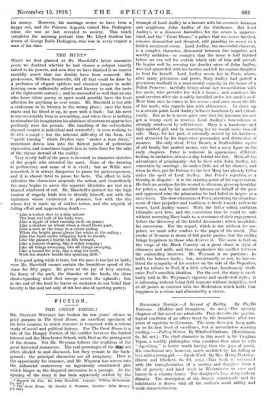FICTION.
THE GREAT • HOUSE.t
Mn. STANLEY WEYALAN has broken his ten years' silence to goal purpose in The Great House, an excellent specimen of his later manner, in which romance is tempered with a serious study of social and political history. For The Great House is a tale of the Hungry Forties, of the conflict between the landed interest and the Manchester School, with Peel as the protagonist of the drama. Yet Mr. Weyman follows the tradition of the great historical romancers. The real personages of the time arc often allirded to and discussed, but they remain in the back- ground: the principal characters are all imaginary. Here is the opportunity for romance, and Mr. Weyman has woven into the industrial controversy an ingeniously constructed plot which hinges on the disputed succession to a peerage. At the opening of the story it has been apparently settled by the • Reynard the Fox. By John Masefleld. London : William Heinemann. [.is. net.] The Great House. By Stanley J. Weyman. London : John Murray. Us. net.]
triumph of Lord Audley in a lawsuit with his eccentric kinsman and neighbour, John Audley of the Gatehouse. But Lord Audley's is a daninosa ho.ereditas, for the estate is impover- ished, and the "Great House," a palace that was never finished, remains dismantled and decayed, still guarding its secret in s. hidden muniment-room. Lord Audley, the successful claimant, is a complex character, distracted between fine impulses and worldly ambition—so complex that the story is half finished before we can tell for certain which side of hips will prevail. He begins well by rescuing the derelict niece of John Audley, who had quarrelled with his brother and left his orphan daughter to fend for herself. Lord Audley meets her in Paris, where, after many privations and perils, Mary Audley had gained a precarious foothold in a semi-menial capacity in the house of a Polish Princess ; tactfully brings about her reconciliation with her uncle, who provides her with a home ; and continues his good services after she is safely installed under her uncle's roof. More than once he comes to her rescue ; and once saves the life of her uncle, who regards him with abhorrence. In short, up to a certain point Lord Audley behaves handsomely and chival- rously. But as he is never quite sure that his kinsman has not got a trump card in reserve, Lord Audley's benevolence is strongly reinforced by self-interest. Mary is a handsome and high-spirited girl, and by marrying her he would make himself safe. Mary, for her part, is naturally moved by his kindness, and attracted by his impressive personality and distinction of manner. His only rival, Peter Basset, a Staffordshire squire of old family but modest means, cuts but a sorry figure in the early chapters. Peter is unheroic in appearance, diffident, lacking in initiative, always a day behind the fair. With all the advantages of propinquity—for he lives with John Audley, his connexion by marriage—he makes little use of his chances, and when he does put his fortune to the test Mary has already fallen under the spell of Lord Audley. But Peter's rejection is a blessing in disguise: it is the starting-point of his regeneration. He finds an anodyne for his wound in altruism, gives up heraldry for politics, and by his unselfish labours on behalf of the poor and oppressed wins the admiration he had failed to inspire as a mere lover. The slow education of Peter, involving the abandon- ment of class prejudice and tradition, is finely traced; and as he waxes, Lord Audley wanes. With the latter selfish ambition triumphs over love, and the conviction that he could b3 safe without marrying Mary leads to a severance of their engagement before the discovery of the fateful documents which invalidate his succession. For the sequel, which is not without its sur- prises, we must refer readers to the pages of the novel. The stroke of Nemesis is shorn of full poetic justice, but the ending brings happiness to those who deserve it. The scene is laid on the verge of the Black Country on a great chase in sight of chimneys and mills, and thus emphasizes the conflict between the contending interests. Mr. Weyman is no partisan : he holds the balance fairly ; but, intentionally or not, he has en- listed the sympathy of his readers on the side of the Repealers, and his tribute to Peel, if a little reluctant, handsomely vindi- cates Peel's unselfish idealism. For the rest, the story is excel- lently told in Mr. Weyman's vigorous and unaffected style ; it is informing without being dull, humane without insipidity, aad at all points in contrast with the Modernism which holds that happiness is a crime and abnormality a virtue.






































 Previous page
Previous page